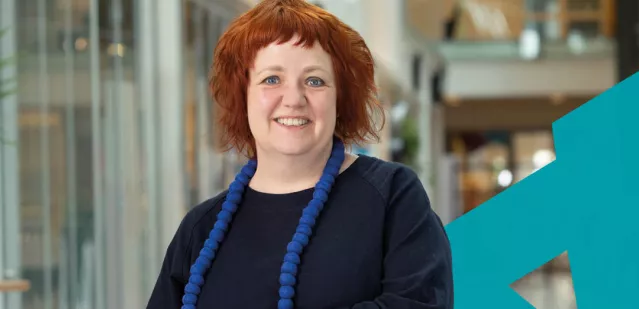
The appeal of teaching
“I had been teaching even before this job, in a different form. I was always the type to share information, as I did at the Foundation for Dutch Municipalities. For me, it truly started with guest lectures at NHL Stenden and I found out that teaching is a magnificent profession. It has a magical quality, talking with a group of young people about the trade. At the moment, I teach a couple of classes to third-year students, in addition to my responsibilities as team leader. I like it a lot. You can see the entire process unfolding with the students; from doubt, snapping out of it, and eureka moments. As an added bonus, I get to work on this beautiful campus. There is a buzz in the hallways, an energy that stimulates a positive work environment, very pleasant.”
Design-Based Education
“Over the last few years, we’ve been working with Design-Based Education. It’s an educational concept that stimulates the interaction with real-life applications, so it goes beyond simply bombarding students with theoretical knowledge. During the programme, we offer plenty of opportunities to apply newfound knowledge, while we all learn from each other. This aligns with my philosophy of life. Back in my day we only used three books and that was it. Acquiring knowledge works very differently nowadays. The time of teachers only sending information is gone, fortunately enough. There’s way more interactivity and room for students to share their thoughts. Of course, we make sure the knowledge is up to standard, but the road towards the end goal is broader and this represents how the real world works.”
Connecting with the field
“With this educational concept especially, we are constantly active, and we form connections with the field. For instance, in the Inclusive Community Lab Poverty and Debt, which I initiated together with an HRM colleague. In this lab we, from Social Studies, work on innovations together with colleagues from Economics & Logistics and International Business Administration, but also with students from Friesland College, professionals in the field and the target group. No one is in charge and everyone contributes. It has grown into a crossover with 70 students from three different academies and this makes me proud. Students gain practical experience, insights and a broader perspective on society from it. Hopefully they’ll take these experiences with them in their career.”
A diverse team of lecturers
“I have a diverse team of young and older colleagues to achieve all of this, all passionate ‘nerds’, as I lovingly like to call them sometimes. They share things with each other in the evening and keep each other posted on interesting LinkedIN articles. Sometimes, I even have to tell them to take it easy! Even with the inevitable transition to online teaching, no one complained, and the team was there for each other. That’s exactly the type of support that new colleagues would receive as well: they’d get a sort of ‘buddy’ that shows them around and helps them out. As a manager I keep close tabs on this process and I assess what someone needs. Some new colleagues need a bit more help in the beginning, while others prefer more space. The first week for a new colleague is often a quiet one, so they can have a chat with colleagues and soak up the work. Eventually though, you have to trust someone to take charge of their role. And whenever they have questions, I’ll be there.”



